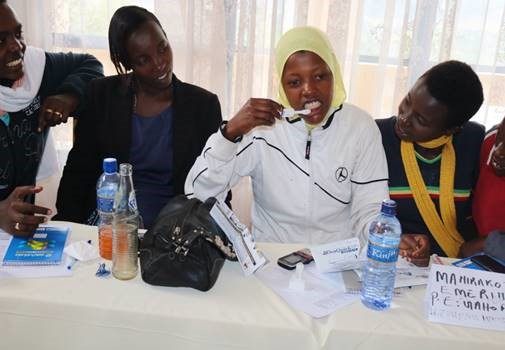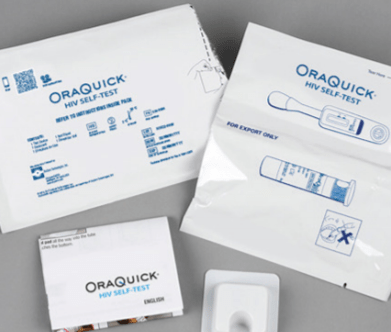Written by Aubrey Weber, Technical Officer, FHI 360
This post is the third in a series on LINKAGES’ country-specific, programmatic success under TOM+ funding and support. The first post in the series focused on the enhanced peer outreach approach (EPOA) in Haiti. The second post in the series highlighted index testing in Cote d’Ivoire.

A peer educator demonstrates how to use OraQuick during a training on self-testing in Ngozi (Photos: LINKAGES Burundi).
In Burundi, HIV is considered a low-prevalence mixed epidemic, with a general adult prevalence of 1.0 percent. However, among key population (KP) groups, prevalence is substantially higher. While limited data exist, the Priorities for Local AIDS Control Efforts (PLACE) study, conducted by MEASURE Evaluation, identified female sex workers (FSWs) and men who have sex with men (MSM) as the most at risk KP groups, with an estimated HIV prevalence of 21.3 percent and 4.8 percent, respectively.
The USAID– and PEPFAR-supported LINKAGES project has been working in Burundi since August 2016. While the team there has made steady progress in reaching FSWs, MSM, and transgender people and linking them to testing services, reaching and newly diagnosing KP individuals living with HIV has been challenging. Because those KPs at highest risk may face substantial barriers to accessing existing testing services – including fear of stigma and discrimination from health care providers – LINKAGES Burundi decided to introduce HIV self-testing (HIVST) as a way to improve testing uptake and HIV case finding.
With support from TOM+* funding, in June 2018, LINKAGES Burundi introduced peer-mediated HIVST using OraQuick in three of the five provinces of project implementation: Bujumbura Mairie, Kayanza, and Ngozi. Peer-mediated HIVST is when a trained peer educator or peer navigator explains to a KP peer how to utilize the kit, provides pre-test counseling, assists the KP peer in the actual use of the test, provides post-test counseling, and refers or accompanies the peer to other needed services. A FSW living in Ngozi province describes her experience:
I had never had an HIV test before, even if I knew that I sometimes [had] unprotected sex, because I was afraid that my status could be known by my neighbors or my clients if I tested in a nearby health center. One day, I was approached by a peer educator providing HIV self-test kits in our area. [She] found me at home and told me about OraQuick, a new test that I could use myself. I agreed to use the test and she showed me how to do it.
HIVST has many advantages, especially for marginalized KP groups. Not only is it confidential and easy to use, but results can also be read directly by the individual taking the test.
The result of the test was positive. At the beginning I felt very afraid, even if it was not a very big surprise to me, but my friend comforted me, and I simply accepted it. The following day, I went to [the] clinic, accompanied by [my peer educator], to have a confirmatory test. This one was also positive, and I started antiretroviral treatment immediately. Since then, I am regularly taking my medicine and my health is well. Nobody in my neighborhood knows anything about my HIV status, apart from my peer educator. But, I now make sure to use condoms with my clients.
Results from the first quarter of HIVST implementation revealed that 748 FSWs used a self-test kit. Of those, 117 screened reactive, 97 were confirmed HIV-positive, and 92 were initiated on antiretroviral treatment. The data show a case finding rate of 13 percent, high performance compared to other testing modalities in Burundi (Figure 1). The results also showed that 116 self-testing kits were distributed to MSM and transgender people, of whom 11 were reactive and 10 were confirmed HIV positive (9 percent case finding).

The TOM+ funding allowed for virtual and on-site technical assistance from the international LINKAGES team to the team in Burundi. Technical assistance included writing HIVST implementation protocols; preparing training materials and strengthening the capacity of the local team and partners to implement the protocols; and supporting the LINKAGES Burundi team to adapt monitoring forms with appropriate PEPFAR and custom indicators to track performance.
Following the successful introduction of HIVST, the LINKAGES Burundi team is now scaling up HIVST to the other three provinces (Bujumbura Rural, Gitega, and Kirundo) where the project is operating. The team is also training new peer educators in the first three provinces to reach other networks of KPs who have rarely or never tested for HIV.
*TOM+ stands for Technical Oversight and Management+ and are earmarked funds from OGAC via USAID for the provision of technical assistance to countries implementing HIV programming.
